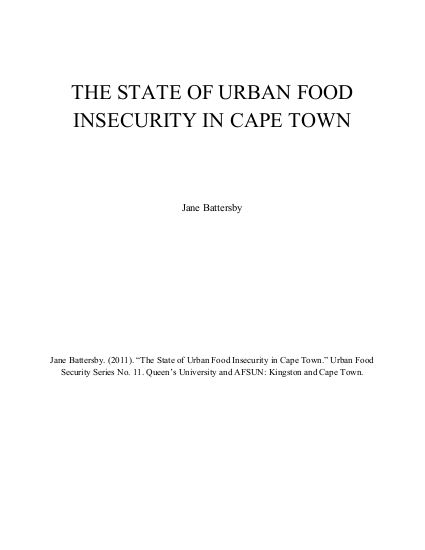Urban Food Security Series | #11

This is part of a series of policy and research papers designed to raise the profile of the urban food security issue in Africa by presenting new research findings and policy recommendations.
The African Food Security Urban Network (AFSUN) was formed in 2007 to address the challenges associated with rising poverty and food insecurity in the rapidly growing cities of Africa.14 AFSUN’s first major undertaking was to plan and implement a baseline urban food security survey in the SADC region. The survey was completed in late 2008 and early 2009.15 This report presents the survey findings for Cape Town, focusing on the food insecurity of the city’s poor communities. While income poverty is an important dimension of food poverty, the report also examines the influence of gender, housing and other household variables on levels of food insecurity in Cape Town. The report examines the food geography of Cape Town and the food sourcing strategies of poor urban households. Finally, it explores the relationship between food insecurity and health. The conclusion draws together the major policy questions that arise in relation to poverty and food security in Cape Town, with a view to providing an evidence-based platform on which to build future strategic responses to urban food insecurity at the metropolitan level.
Links
Resource collections
- Topics
- UN Habitat - Urban Response Collection
- Urban Response - Urban Crisis Preparedness and Risk Reduction
- Urban Response Collection - Community Engagement and Social Cohesion
- Urban Response Collection - Economic Recovery
- Urban Response Collection - Environment and Climate Change
- Urban Response Collection - Housing, Land and Property
- Urban Response Collection - Urban Crisis Response, Recovery and Reconstruction
- Urban Response Collection - Urban Resilience
